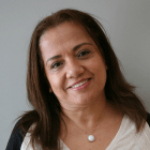I am a human kaleidoscope
BEIRUT, January 26, 2015 – On Saturday the 10th of January – on the eve of the historic unity march held in Paris after the Charlie Hebdo attacks – two suicide bombers blew themselves up in a café in the Jabal Mohsen quarter of Tripoli, in north Lebanon. The attack left nine people dead and 37 wounded.
As I sent up my news alerts, I thought of the horror that religious hatred can unleash. Both young Lebanese bombers, members of the Al-Nusra Front, knew the area well. They grew up half a mile down the road. They chose to blow up their own neighbourhood…. Because it was an Alawite quarter. And they were Sunnis.
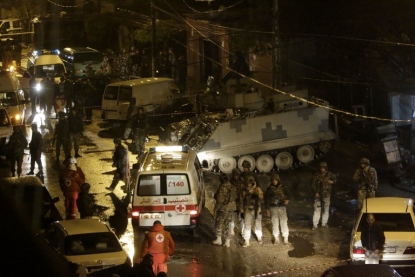
Lebanese security forces outside a cafe targeted by a suicide bombing on January 10, 2015 in the Jabal Mohsen Alawite
neighbourhood of the northern city of Tripoli (AFP Photo / Ibrahim Chalhoub)
Late that night, still hard at work, I received a phone call from a journalist friend. “What? Still working?” she exclaimed. “Go to bed my dear. No one will use your story. Tomorrow is the Paris march. No one gives a hoot about Jabal Mohsen.”
Arab, French and Western
She told me it hurt her to say so. But I knew she was right.
Like many of my compatriots here in Lebanon, a country born of a marvelous mix of Arab culture, French and Western civilisation, what happened in Paris fills me with a complex mix of empathy and sadness. The druze leader Walid Jumblatt summed up those feelings well on the day of the march, writing on Twitter: “We are Charlie, but we are also Palestine and Syria.”
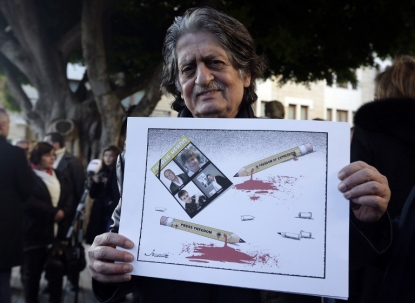
Lebanese cartoonist Stavro Jabra holds a picture drawn in tribute to the Charlie Hebdo victims on January 11, 2015
during a rally in downtown Beirut (AFP Photo / Anwar Amro)
It comes as little surprise in a country, and a part of the world, torn by its divisions and endless conflicts, but all around me I can sense the Paris attacks - and the global response to them - fuelling conflicting, contradictory reactions. Many of them I share.
Glued to TV screen
The day after the unity march, the Lebanese newspaper An-Nahar ran a front-page picture of the colossal crowd thronging the Place de la Republique at nightfall, under the headline: “Paris, capital of the world, an unprecedented response to terrorism.”
A powerful picture, and a headline that said it all. The paper captured exactly how I was feeling as I sat glued to my television screen until two in the morning.
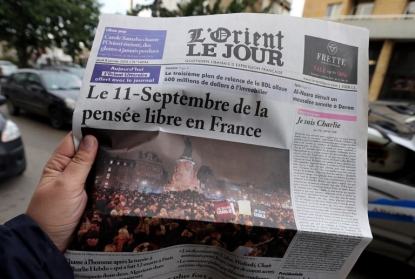
Lebanon's 'L'Orient Le Jour' headlines'September 11 for free speech in France' on January 8, 2015 (AFP Photo / Joseph Eid)
But the march inspired more than a straightforward surge of emotion.
“I am not Charlie,” a priest told me that same Sunday, reminding me of the longstanding gripes of Christian churchgoers against the satirical weekly, which delighted in ridiculing all religions alike. “But I am against terrorism,” he said. I found that I agreed with him.
Kaleidoscope of emotions
I can also understand the disappointment – on loud display on social media – at the presence of Israeli Prime Minister Benjamin Netanyahu at the Paris march, when the memory of Israel’s devastating bombing of the Gaza Strip is still fresh in everyone’s mind here.
I am a kaleidoscope of conflicting emotions.
That same Sunday afternoon, hundreds of journalists, intellectuals and activists gathered in central Beirut to voice their solidarity with France, their support for free speech, and for a paper that few had ever had occasion to read. Charlie Hebdo has never been distributed in Lebanon, a multi-confessional country where matters of religion are highly sensitive.
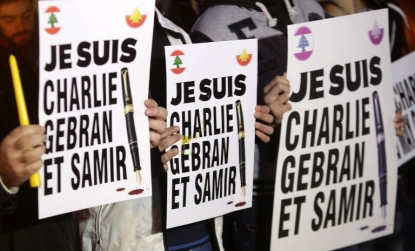
Lebanese hold placards reading in French 'l am Charlie, Gebran and Samir' on January 10, 2015
at Samir Kassir Square in Beirut (AFP Photo / Anwar Amro)
They were also carrying placards with the words: “I am Gebran Tueni” and “I am Samir Qassir”, two journalists murdered in 2005 in car bomb attacks widely blamed on the Syrian regime.
Others chanted the slogan, “No to terrorism, No to Hezbollah” the Shiite Lebanese movement whose members are accused by a UN court of assassinating the former prime minister Rafik Hariri in 2005.
Syrians keep dying
After four years of covering the war in Syria, I realise with sadness that we will never see four million people take to the streets to try to stop the bloodshed there.
And yet people keep dying, day after day. More than 200,000 so far, including around 1,000 in a single night in August 2013, in a chemical weapons attack in East Ghouta near Damascus.
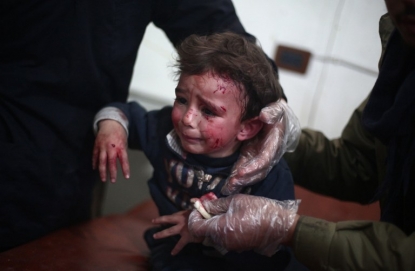
A wounded child is treated at a makeshift hospital in the rebel-held area of Douma, northeast of Damascus, on January 21, 2015
(AFP Photo / Abd Doumany)
In the space of a few months, jihadists have executed an estimated 2,000 people. Countless poor people beheaded, tortured, humiliated… Thousands more killed by barrel bombs in Aleppo province in Syria’s north, among them children playing outside their front door, in their school playground. Many of the victims died as they hid in terror from the roar of aircraft above their heads. Death found them anyway.
Chanting for 'freedom'
For them, no million-strong marches in the capitals of Arab or Western countries. Not thousands, even.
The giant rallies that followed the attacks on Charlie Hebdo and a kosher grocery store in Paris stirred in me the memory of the first year of the Syrian “revolution”. It was a time when we journalists waited impatiently for each Friday to come around, to tell the world about the mass gatherings all over the county, the crowds chanting “Freedom, Freedom”.
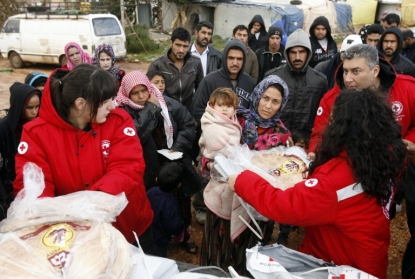
Red Cross volunteers distribute bread at a camp housing Syrian refugees on January 8, 2015
in the southern Lebanese village of Debbine (AFP Photo / Mahmoud Zayyat)
The graffiti, the cartoons, the slogans, the whole mood of those marches was peaceful and friendly. It spoke volumes about the aspirations of a people battered by long years of dictatorship. And we took real pleasure in covering the movement – trying to find the right turns of phrase in French and English to convey its quirky, funny, expressive slogans.
A before and after Charlie?
How things have changed. The peaceful demonstrators, the activists who led these marches, the young Syrians who dreamed of democracy and freedom are dead or have left Syria. Some have turned radical. Others have fallen into corruption and crime. Terror has won the day.
I don’t know whether the events in Paris will make a difference. If there will be a “before and after” Charlie Hebdo as many commentators suggested in the wake of the January 7 attacks. But I do know that a French writer expressed the feelings of many in this part of the world, in a television debate the night of the march.
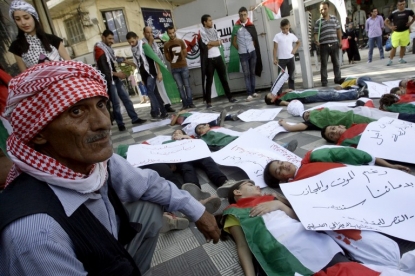
Children from Palestinian refugee camps in the southern Lebanese city of Sidon protest against Israel's Gaza offensive
on July 27, 2014 (AFP Photo / Mahmoud Zayyat)
“All it took was for five Westerners to be beheaded (by jihadists in Syria) for the world to go to war. All it took was a terrorist attack in Paris for the whole world to take to the streets,” he said. While the victims in Syria and across the Arab world were not enough to drive the world to war, or to march in its millions.
Because it’s not just about Syria. You’ll never see four million people, dozens of heads of state among them, on the street to demand an end to conflict in the Palestinian territories. In that respect, the Paris events have revived the sense, among Arab journalists, that the West applies double standards when it comes to Israel and the Arab world.
The resentment is not directed at the West alone. A Lebanese-Egyptian colleague, torn between admiration and disappointment, told me that Sunday night: “I respect all those French people who went down into the street to defend their values and beliefs. I even envy them. What shocks and disgusts me, is to see Arab leaders taking part in the march as if all was just fine at home.”
Rita Daou is deputy head of AFP's Beirut bureau


